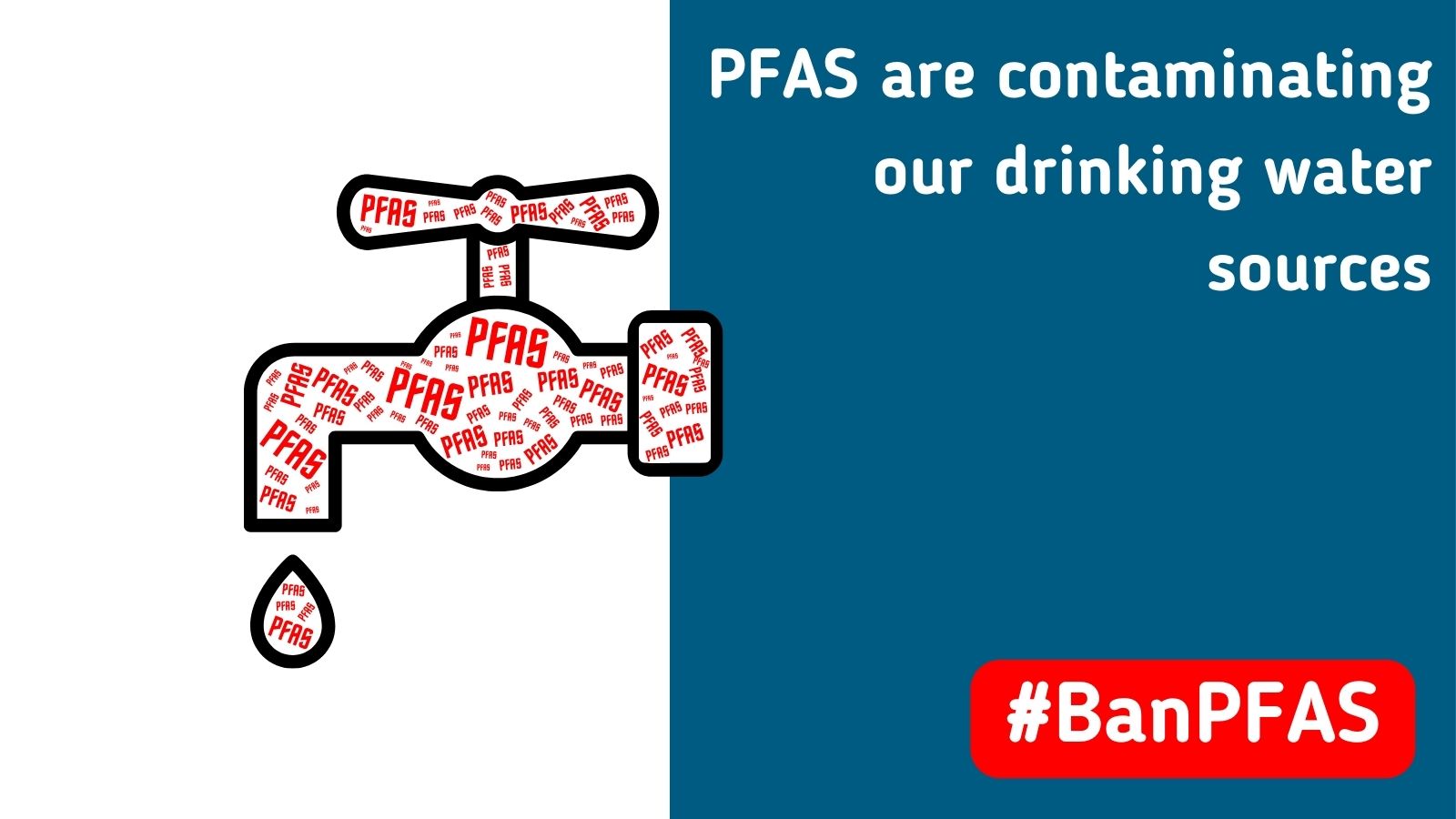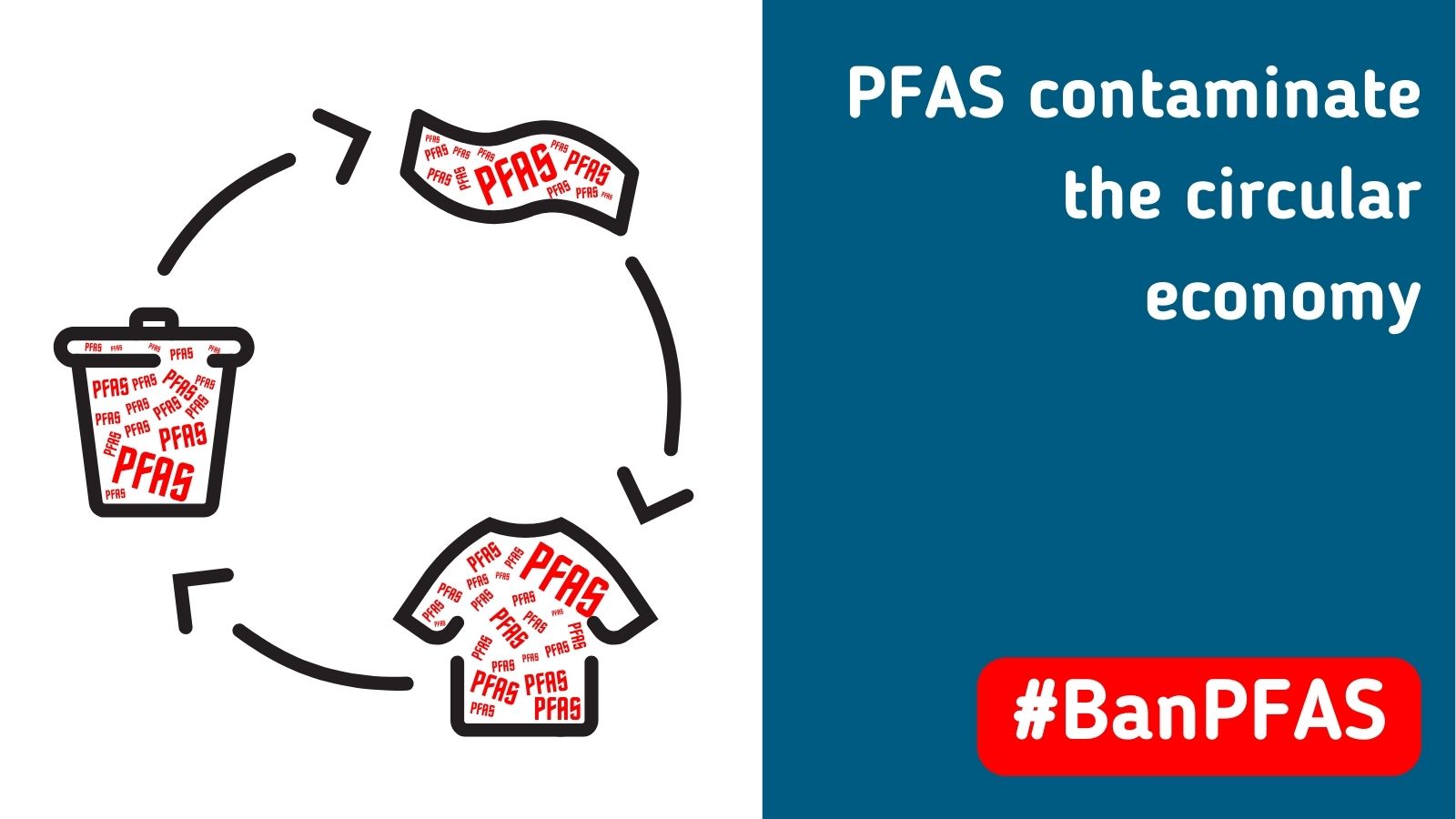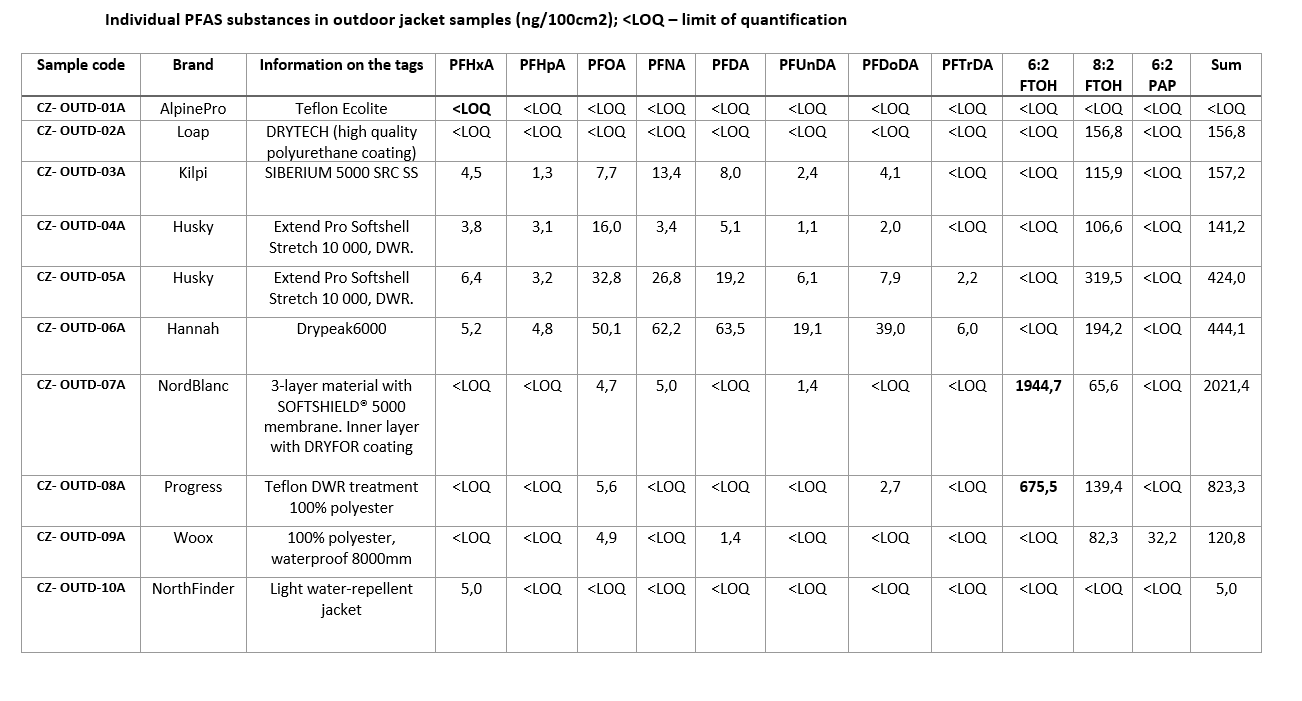PRAGUE - The waterproof function of most children's outdoor jackets made by Czech manufacturers is achieved with the use of so-called forever chemicals or PFAS (1). The intentional use of PFAS was detected in 8 out of 10 products analyzed by Arnika. The detected substances are linked to liver damage, various cancers, effects on the reproductive system, developmental defects, thyroid disease or higher cholesterol levels. Czech manufacturers respond to the growing concerns about forever chemicals variously (2) - the frontrunners are already substituting them with safer alternatives, others are waiting for the legislation to restrict these substances, some claim that PFAS are essential to ensure the water resistance of clothing and that alternatives are lacking in functionality and durability.
At least one of the 58 analyzed PFAS substances was detected in 9 of the 10 children's jackets. (3) "PFAS concentrations in the jackets suggest that 8 of the 10 children's jackets were intentionally treated with PFAS chemicals to ensure their water resistance; one jacket was probably contaminated during the manufacturing process. This contamination demonstrates the ubiquity of forever chemicals in manufacturing processes. A clean jacket with no PFAS detected, on the other hand, proves that alternatives exist and that manufacturers are ready to phase PFAS out completely," explains study author Mgr. Jitka Straková from Arnika.
PFAS substances are called forever chemicals because they accumulate in the human body and persist in the environment indefinitely. PFAS "forever chemicals" are repeatedly found in human blood. The recent human biomonitoring study under the HBM4EU project revealed alarming findings of PFAS contamination in the blood of European teenagers - 14% of blood samples exceeded the European Food Safety Authority's recommended health limit. Teenagers with a higher consumption of eggs and fish are those with highest PFAS levels in blood. "The situation in the Czech Republic is no different and we have detected these substances in sewage sludge, fish from rivers and drinking water. Moreover, the PFAS contamination of our water system comes primarily from our own sources and activities. As Czechia is located upstream of all the Czech rivers, all PFAS detected were released into the nature by us," says Prof. Tomáš Cajthaml, Ph.D., DSc, Director of the Institute for the Environment, Faculty of Science, Charles University.

"The use of some of the most toxic contaminants of our drinking water, i.e. PFAS, is unnecessary in the case of children's clothing. The durable water-repellent PFAS coating is washed off after a few washing cycles, thus releasing PFAS substances into the water and further into the environment. Yet most consumers do not need the jacket's water repellency in everyday use of the product. These materials were originally developed for extreme weather conditions in high elevations of the highest mountains. Consumers in the US and Western Europe are aware of these risks associated with PFAS and have started to put pressure on global outdoor clothing brands to replace PFAS with suitable alternatives," says Arnika's Consumer Campaigns Manager Mgr. Karolína Brabcová (4).

The significant impact on health and the environment is one of the many reasons why a few substances from the PFAS group are banned globally by the Stockholm Convention and the European Union is currently in the process of restricting the entire PFAS class. NGOs, including Arnika, remind European politicians to keep the promise and adopt a wide restriction of the entire PFAS group within the EU chemicals by the end of the EU parliamentary term (i.e. mid-2024). That is why Arnika initiated, together with other European NGOs, the Ban PFAS Manifesto to restrict the PFAS in Europe and provide funds and ensure decontamination of the most polluted hotspots (5). By November 2022, over 90 NGOs have signed the Manifesto.
For more information, please contact the study author Jitka Strakova (This email address is being protected from spambots. You need JavaScript enabled to view it., +420 777 266 386) or Karolína Brabcová (This email address is being protected from spambots. You need JavaScript enabled to view it., +420 731 321 737).
Explanatory notes:
(1) PFASs (per- and polyfluoroalkyl substances known as "forever chemicals") are man-made synthetic substances that pose a range of problems for human health and the environment. They persist in the environment and circulate in the atmosphere for long periods of time. They travel far from their point of origin and are virtually ubiquitous in the environment. They have a negative effect on human fertility, fetal development and thyroid hormone function.
Today, PFASs are used in a wide range of applications - in outdoor clothing to make it waterproof, in fast-food packaging to prevent oil leakage, and in firefighting foams. Humans are exposed to ‘forever chemicals' from diet and drinking water, but house dust and indoor environments, personal care products and other consumer goods are also major sources.
Photo gallery of individual sample
(2) Manufacturers statements on the Arnika survey results
All manufacturers were informed about the survey results 14 days prior the press release. Five manufacturers out of nine responded: Woox phased out PFAS containing DWR treatment since 2020 and the sampled jacket was part of the earlier collection. Northfinder has been producing PFAS-free clothing for 5 years now. Kilpi commented in general terms that they are addressing the issue and are evaluating alternatives. Progress is gradually replacing these fabrics with available alternatives. Alpine-Pro launched a collection of PFAS-free jackets already in 2018. It currently uses only PFAS-free membranes in its clothing. Due to some customers' complains about the water resistance of jackets treated with PFAS substitutes, Alpine-Pro switched to PFAS coating - i.e. C6 substances – in 10% of its adult jackets. Other companies did not comment on the results.
(3) Results of the analysis of PFAS in children's jackets
The samples were analysed at the Institute of Environmental Sciences, Faculty of Science, Charles University, under the direction of Prof. Tomáš Cajthaml, Ph.D., DSc.

(4) In West Virginia and other locations in the USA, where PFAS substances including globally banned PFOA have been produced since the 1950s, chemical corporations contaminated communities living in the vicinity of chemical factories. The people living close to the PFAS production plants suffered from a higher incidence of cancer, thyroid function disorders and other numerous health effects. Similar cases of contamination around PFAS production plants have been recently reported in Italy, Belgium and Denmark. As a result, consumer awareness is higher and the public demand to phase out PFAS from everyday products resulted in a faster and more efficient market shift to safer alternatives.
The Project is funded by the EU LIFE Programme (LIFE AskREACH No. LIFE16 GIE/DE/000738) and the city of Prague. The views expressed are the sole responsibility of Arnika and do not reflect those of the European Union or other donors.








